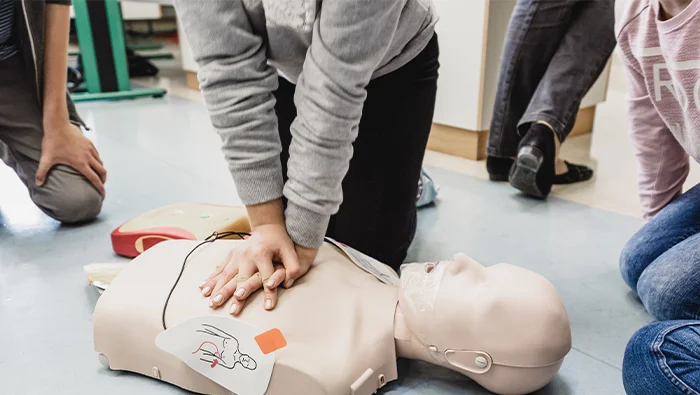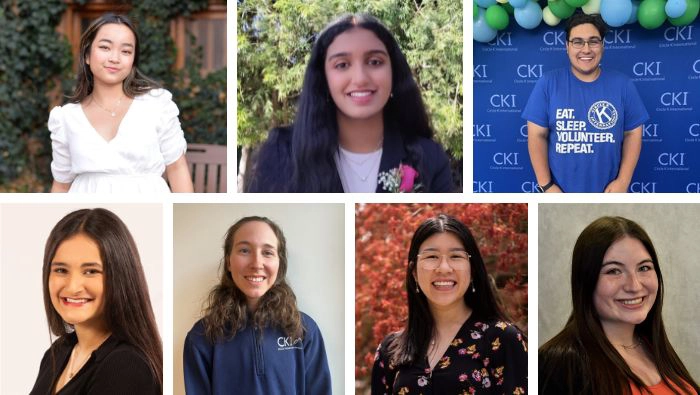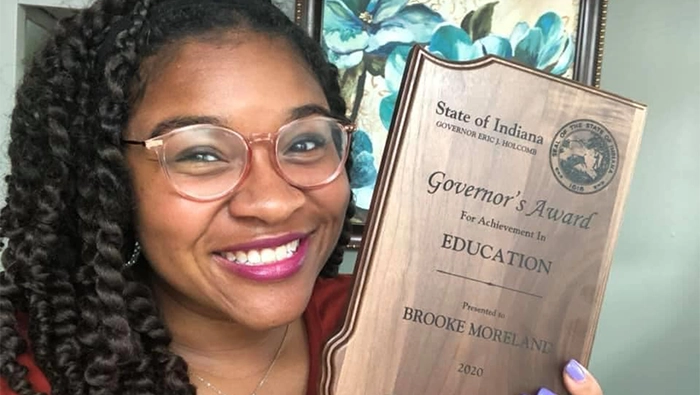
Grants help young leaders grow
The Kiwanis Children’s Fund is helping clubs fulfill the Kiwanis cause of youth leadership development.
By Erin Chandler
Kiwanians know that today’s children are the future of every community around the world. That’s why Kiwanis clubs help kids to not only survive but thrive as they grow into adulthood. The following six projects received club grants from the Kiwanis Children’s Fund to help kids across four continents grow into leaders who give back to their communities.
The skills to save lives
In 2022, the Kiwanis Club of Christchurch, New Zealand, partnered with FACT Co to provide a three-week first aid and CPR training course for 11- and 12-year-olds at Opawa School. Club members wanted to make sure that families’ financial needs did not present barriers to kids learning vital skills that could save lives — and they found the students’ enthusiasm in learning “amazing to see.” Some of the children even expressed a newfound interest in medical careers. A grant from the Kiwanis Children’s Fund will allow the club to bring its first-aid program to more schools this year, ensuring that more kids will develop lifelong skills that will benefit themselves and their communities.
Confidence through new clothes
The Kiwanis Club of Matthews, North Carolina, U.S., has helped local families purchase clothes for their school-age children for over 20 years. School counselors and social workers help identify children who are most in need, including those experiencing homelessness. Then, over a two-week period, Kiwanis volunteers help these families shop for school clothes, underwear and shoes. The club emphasizes how new clothes can give children in difficult circumstances the confidence and self-esteem to perform better in school, setting them on the path to brighter futures. A Kiwanis Children’s Fund club grant will help the club fight inflation so that families can purchase all the items they need.
After-school tutoring and anti-drug abuse program
For three years, the Kiwanis Club of Szu Hai Nu in Taichung City, Taiwan, has provided an after-school tutoring program for first- through sixth-grade children from low-income, new-immigrant, single-parent, skipped-generation and indigenous families. The program includes English reading, art and sports time — and two years ago, the club added a component to educate students on drug abuse prevention. Attendance for the program, which is prepared and run by Kiwanians and teachers, has doubled since it began, and it now serves hundreds of students. A grant from the Kiwanis Children’s Fund will help cover the price of additional equipment and materials, including bilingual resources. Club members hope to have a meaningful impact on their community by guiding children’s development in a fun and safe environment.
Feeding bodies and minds
The Kiwanis Club of Fairfield-Villa Rica’s Kids In Need program takes a multipronged approach to helping kids in its Georgia, U.S., community develop into the next generation of leaders. Throughout the school year, the club hands out weekend food backpacks to 140 children, pays the lunch debts of students in the reduced meal program, provides snacks to students who miss breakfast and supplies clothing and hygiene products through school care closets. A Kiwanis Children’s Fund club grant will help expand this program to more kids as demand increases. During the break between academic years, the club sponsors children in kindergarten through sixth grade to attend Camp Invention, a weeklong STEM program conducted by the National Inventors Hall of Fame. Through this program, the club helps kids in difficult circumstances foster their interests and talents for the bright futures ahead of them.
Developing scholarly and leadership skills
In Cartago Valle del Cauca, Colombia, the Kiwanis Club of Mariscal Robledo, Cartago, is helping kids stay in school and develop leadership skills. The club currently provides scholarships to 15 children who are at risk of dropping out of school due to their families’ financial circumstances. The club also helps pay for books, videos, computers, chairs, tables and more for a program that teaches values such as leadership and social responsibility. Next year, a Kiwanis Children’s Fund grant will help members serve even more children. Club members recognize how programs like this can improve students’ academic achievement and their sense of belonging to a community — qualities that will strengthen children’s home lives and help them build a more constructive society as they grow up.
Sowing values
The Kiwanis Club of Quito, Ecuador, is working to instill the values of leadership and service in young people through its “Training in Values” program. The club will use funds from a Kiwanis Children’s Fund grant to purchase second-edition copies of the book “Kiwanis Sembrando Valores (Kiwanis Sowing Values).” Combined with a YouTube video series, the lessons and activities in this book will help thousands of kids learn how to make a difference in their communities.
How you can help
The Kiwanis Children’s Fund makes grants that improve the lives of children around the world by identifying the projects that create a continuum of impact in a child’s life — one that spans their entire childhood and sets them up for a bright future. By funding projects that target the Kiwanis causes —health and nutrition, education and literacy, and youth leadership development — whether through a Kiwanis Club’s local service project or through a club’s partner, the Children’s Fund ensures that its grantmaking has the greatest possible impact.
If you are interested in extending your and your club’s impact beyond your community, make a gift to the Children’s Fund or learn how your club can apply for a grant to help kids in your community.


